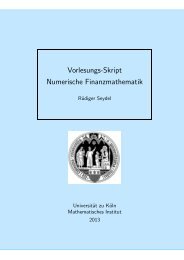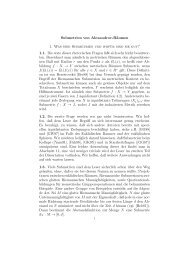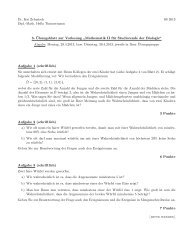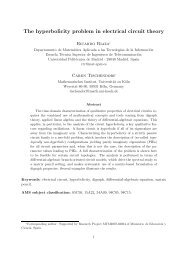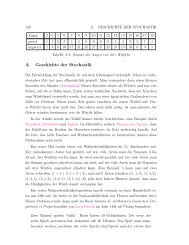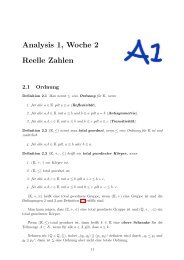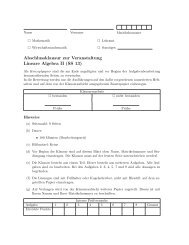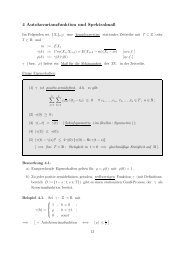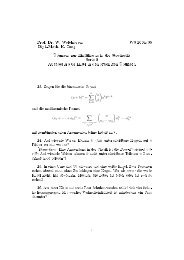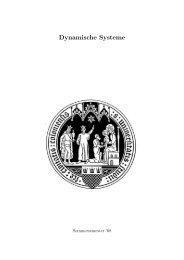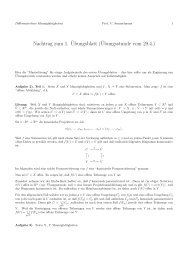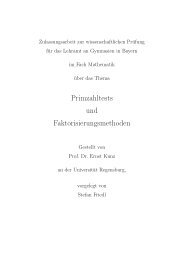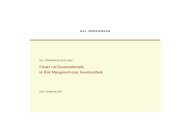Inhaltsverzeichnis - Mathematisches Institut der Universität zu Köln
Inhaltsverzeichnis - Mathematisches Institut der Universität zu Köln
Inhaltsverzeichnis - Mathematisches Institut der Universität zu Köln
You also want an ePaper? Increase the reach of your titles
YUMPU automatically turns print PDFs into web optimized ePapers that Google loves.
DMV Tagung 2011 - <strong>Köln</strong>, 19. - 22. September<br />
Pascal Hei<strong>der</strong><br />
<strong>Universität</strong> <strong>Köln</strong><br />
Arbitrage-free Approximation of Call Price Surfaces<br />
In this talk I present a construction of arbitrage-free call price surfaces from observed market data by<br />
locally constrained least squares approximations. Derivatives of the surface are computed accurately so<br />
that implied volatility, local volatility and transition probability density are obtained at no additional costs.<br />
Observed input data are afflicted by a price uncertainty and cause an input data risk on the computed<br />
call surface. I present a simple model for the input risk and perform an analysis to study and measure the<br />
effect of the input risk on the surfaces. With this analysis one can determine the trust-worthiness of the<br />
computed results and their implications on option pricing a posteriori.<br />
Christian Jonen<br />
<strong>Universität</strong> <strong>zu</strong> <strong>Köln</strong><br />
Valuing High-Dimensional American-Style Derivatives: A Robust Regression Monte Carlo<br />
Method<br />
Pricing high-dimensional American-style <strong>der</strong>ivatives is still a challenging task, as the complexity of numerical<br />
methods for solving the un<strong>der</strong>lying mathematical problem rapidly grows with the number of uncertain<br />
factors. In this paper we extend the important class of regression-based Monte Carlo methods for valuing<br />
these complex financial products. The key idea of our proposed approach is to fit the continuation value<br />
at every exercise date by robust regression rather than by ordinary least squares. By using robust regression,<br />
we are able to get a more accurate approximation of the continuation value due to taking outliers<br />
in the cross-sectional data into account. In or<strong>der</strong> to guarantee an efficient implementation of our Robust<br />
Regression Monte Carlo (RRM) method, we suggest a new Newton-Raphson-based solver for robust regression<br />
with very good numerical properties. We use techniques of the statistical learning theory to prove<br />
the convergence of our RRM estimator. In or<strong>der</strong> to test the numerical efficiency of our proposed method,<br />
we price Bermudan options on up to thirty assets. It turns out that our RRM approach shows a remarkable<br />
convergence behavior; we get speed-up factors of up to over four compared with the state-of-the-art Least<br />
Squares Monte Carlo method proposed by Longstaff and Schwartz (2001).<br />
Literatur<br />
C. Jonen (2011). Valuing high-dimensional American-style <strong>der</strong>ivatives: a robust regression Monte Carlo<br />
method. To be submitted.<br />
F. Longstaff and E. Schwartz (2001). Valuing American options by simulation: a simple least-squares<br />
approach. Review of Financial Studies, 14, 113 - 147.<br />
179



